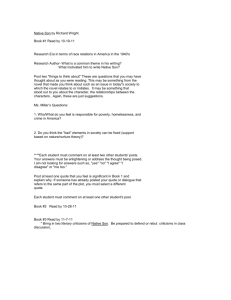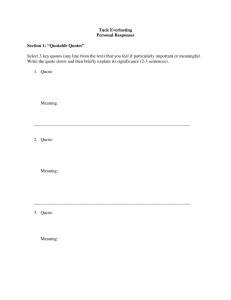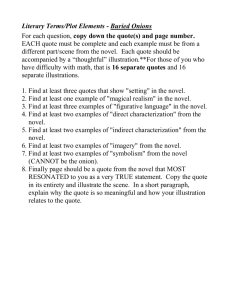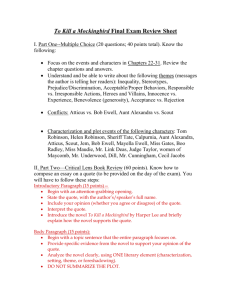12th Grade Summer Reading Assignment 2013
advertisement
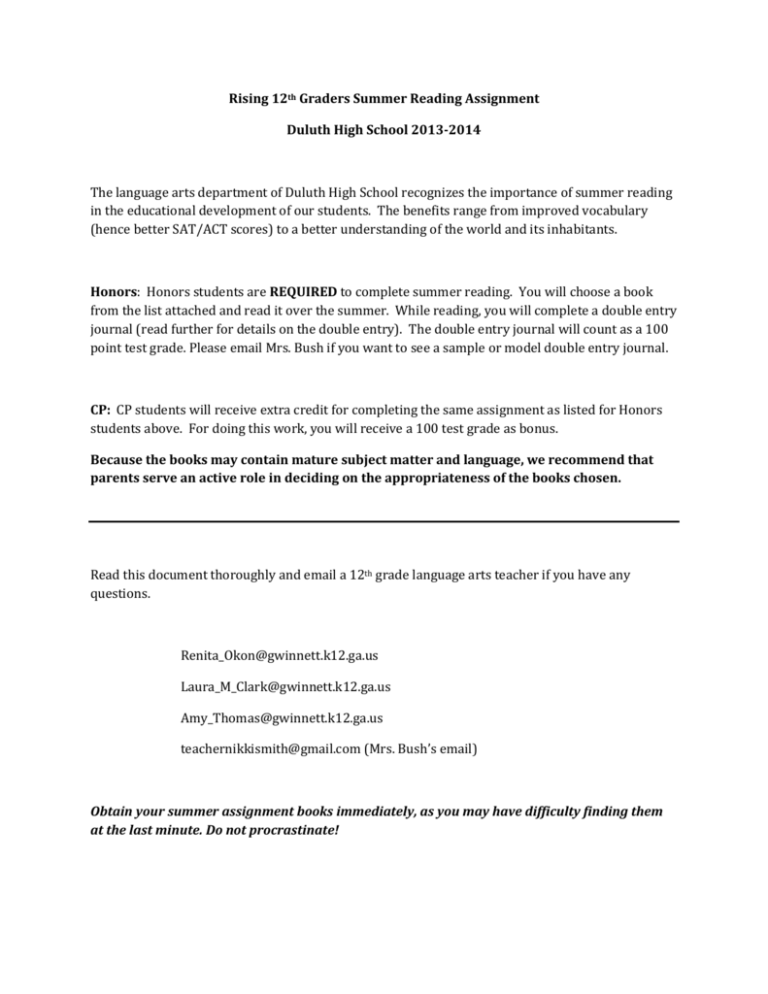
Rising 12th Graders Summer Reading Assignment Duluth High School 2013-2014 The language arts department of Duluth High School recognizes the importance of summer reading in the educational development of our students. The benefits range from improved vocabulary (hence better SAT/ACT scores) to a better understanding of the world and its inhabitants. Honors: Honors students are REQUIRED to complete summer reading. You will choose a book from the list attached and read it over the summer. While reading, you will complete a double entry journal (read further for details on the double entry). The double entry journal will count as a 100 point test grade. Please email Mrs. Bush if you want to see a sample or model double entry journal. CP: CP students will receive extra credit for completing the same assignment as listed for Honors students above. For doing this work, you will receive a 100 test grade as bonus. Because the books may contain mature subject matter and language, we recommend that parents serve an active role in deciding on the appropriateness of the books chosen. Read this document thoroughly and email a 12th grade language arts teacher if you have any questions. Renita_Okon@gwinnett.k12.ga.us Laura_M_Clark@gwinnett.k12.ga.us Amy_Thomas@gwinnett.k12.ga.us teachernikkismith@gmail.com (Mrs. Bush’s email) Obtain your summer assignment books immediately, as you may have difficulty finding them at the last minute. Do not procrastinate! This assignment must be typed (TNR, 12 pt. font, double-spaced) and is worth a 100-point test grade. Due date: Friday, August 9th ***Please note that there are no acceptable excuses for late assignments. Please email your teacher the assignment if you are absent on the due date. *** Dystopian Choice Book – Please pick ONE dystopian novel from the list below to read over the summer. Please read closely and annotate your text. Bring this text to school during the first week of school. See the attached “Characteristics of Dystopian Texts” in this packet. THE CLASSICS: Anthem – Ayn Rand This is a short novel about a man who escapes a society from which all individuality has been squeezed. Written a full decade before Orwell's "1984" Rand expertly shows how collectivism is destroying individuality and is being practiced throughout the world including the "New Deal" programs in the United States. During this time in world, history people are becoming serfs to the state as F. A. Hayek, the noted libertarian economist would put it. Rand's philosophy is really quite simple; planning is a synonym for "collectivism" and "collectivism" is a metaphor for Communism. Fahrenheit 451 – Ray Bradbury (don’t read if you were in Mrs. Blevins’ class – choose a diff. book) In Fahrenheit 451, Ray Bradbury's classic, frightening vision of the future, firemen don't put out fires--they start them in order to burn books. Bradbury's vividly painted society holds up the appearance of happiness as the highest goal--a place where trivial information is good and knowledge and ideas are bad. Fire Captain Beatty explains it this way, "Give the people contests they win by remembering the words to more popular songs.... Don't give them slippery stuff like philosophy or sociology to tie things up with. That way lies melancholy." Guy Montag is a book-burning fireman undergoing a crisis of faith. His wife spends all day with her television "family," imploring Montag to work harder so that they can afford a fourth TV wall. Their dull, empty life sharply contrasts with that of his next-door neighbor Clarisse, a young girl thrilled by the ideas in books, and more interested in what she can see in the world around her than in the mindless chatter of the tube. When Clarisse disappears mysteriously, Montag is moved to make some changes, and starts hiding books in his home. MODERN CLASSICS: Oryx and Crake – Margaret Atwood Atwood has visited the future before, in her dystopian novel, The Handmaid's Tale. In her latest, the future is even bleaker. The triple whammy of runaway social inequality, genetic technology and catastrophic climate change, has finally culminated in some apocalyptic event. As Jimmy, apparently the last human being on earth, makes his way back to the RejoovenEsencecompound for supplies, the reader is transported backwards toward that cataclysmic event, its full dimensions gradually revealed. Jimmy grew up in a world split between corporate compounds (gated communities metastasized into city-states) and pleeblands (unsafe, populous and polluted urban centers). His best friend was "Crake," the name originally his handle in an interactive Net game, Extinctathon. Even Jimmy's mother-who ran off and joined an ecology guerrilla group when Jimmy was an adolescent-respected Crake, already a budding genius. The two friends first encountered Oryx on the Net; she was the eight-year-old star of a pedophilic film on a site called HottTotts. Oryx's story is a counterpoint to Jimmy and Crake's affluent adolescence. She was sold by her Southeast Asian parents, taken to the city and eventually made into a sex "pixie" in some distant country. Jimmy meets Oryx much later-after college, after Crake gets Jimmy a job with ReJoovenEsence. Crake is designing the Crakers-a new, multicolored placid race of human beings, smelling vaguely of citron. He's procured Oryx to be his personal assistant. She teaches the Crakers how to cope in the world and goes out on secret missions. The mystery on which this riveting, disturbing tale hinges is how Crake and Oryx and civilization vanished, and how Jimmy-who also calls himself "the Snowman," after that other rare, hunted specimen, the Abominable Snowman-survived. Chesterton once wrote of the "thousand romances that lie secreted in The Origin of Species." Atwood has extracted one of the most hair-raising of them, and one of the most brilliant. Parable of the Sower – Octavia Butler Octavia E. Butler, the grande dame of science fiction, writes extraordinary, inspirational stories of ordinary people. Parable of the Sower is a hopeful tale set in a dystopian future United States of walled cities, disease, fires, and madness. Lauren Olamina is an 18-year-old woman with hyperempathy syndrome--if she sees another in pain, she feels their pain as acutely as if it were real. When her relatively safe neighborhood enclave is inevitably destroyed, along with her family and dreams for the future, Lauren grabs a backpack full of supplies and begins a journey north. Along the way, she recruits fellow refugees to her embryonic faith, Earthseed, the prime tenet of which is that "God is change." This is a great book--simple and elegant, with enough message to make you think, but not so much that you feel preached to. Handmaid’s Tale – Margaret Atwood Atwood presents here a fable of the near future. In the Republic of Gilead, formerly the United States, far-right, religious extremists type ideals have been carried to extremes in the monotheocratic government. The resulting society is a feminist's nightmare: women are strictly controlled, unable to have jobs or money and assigned to various classes: the chaste, childless Wives; the housekeeping Marthas; and the reproductive Handmaids, who turn their offspring over to the "morally fit" Wives. The tale is told by Offred (read: "of Fred"), a Handmaid who recalls the past and tells how the chilling society came to be. Never Let Me Go – Kazuo Ishiguro All children should believe they are special. But the students of Hailsham, an elite school in the English countryside, are so special that visitors shun them, and only by rumor and the occasional fleeting remark by a teacher do they discover their unconventional origins and strange destiny. Kazuo Ishiguro's sixth novel, Never Let Me Go, is a masterpiece of indirection. Like the students of Hailsham, readers are "told but not told" what is going on and should be allowed to discover the secrets of Hailsham and the truth about these children on their own. Offsetting the bizarreness of these revelations is the placid, measured voice of the narrator, Kathy H., a 31-year-old Hailsham alumna who, at the close of the 1990s, is consciously ending one phase of her life and beginning another. She is in a reflective mood, and recounts not only her childhood memories, but her quest in adulthood to find out more about Hailsham and the idealistic women who ran it. Although often poignant, Kathy's matter-of-fact narration blunts the sharper emotional effects you might expect in a novel that deals with illness, self-sacrifice, and the severe restriction of personal freedoms. The Road - Cormac McCarthy Cormac McCarthy sets his new novel, The Road, in a post-apocalyptic blight of gray skies that drizzle ash, a world in which all matter of wildlife is extinct, starvation is not only prevalent but nearly all-encompassing, and marauding bands of cannibals roam the environment with pieces of human flesh stuck between their teeth. If this sounds oppressive and dispiriting, it is. McCarthy may have just set to paper the definitive vision of the world after nuclear war, and in this recent age of relentless saber-rattling by the global powers, it's not much of a leap to feel his vision could be not far off the mark nor, sadly, right around the corner. Stealing across this horrific (and that's the only word for it) landscape are an unnamed man and his emaciated son, a boy probably around the age of ten. The love of a desperate father for his sickly son transcends all else. McCarthy has always written about the battle between light and darkness; the darkness usually comprises 99.9% of the world, while any illumination is the weak shaft thrown by a penlight running low on batteries. In The Road, those batteries are almost out--the entire world is, quite literally, dying--so the final affirmation of hope in the novel's closing pages is all the more shocking and maybe all the more enduring as the boy takes all of his father's (and McCarthy's) rage at the hopeless folly of man and lays it down, lifting up, in its place, the oddest of all things: faith. MADE FAMOUS BY THE MOVIE. . . BUT THE BOOK IS BETTER! (AND DIFFERENT) I Am Legend – Richard Matheson One of the most influential vampire novels of the 20th century, I Am Legend regularly appears on the "10 Best" lists of numerous critical studies of the horror genre. As Richard Matheson's third novel, it was first marketed as science fiction (for although written in 1954, the story takes place in a future 1976). A terrible plague has decimated the world, and those who were unfortunate enough to survive have been transformed into blood-thirsty creatures of the night. Except, that is, for Robert Neville. He alone appears to be immune to this disease, but the grim irony is that now he is the outsider. He is the legendary monster who must be destroyed because he is different from everyone else. Employing a stark, almost documentary style, Richard Matheson was one of the first writers to convince us that the undead can lurk in a local supermarket freezer as well as a remote Gothic castle. His influence on a generation of bestselling authors--including Stephen King and Dean Koontz--who first read him in their youth is, well, legendary. Running Man – Stephen King Stephen King (writing as Richard Bachman) describes a science fiction dystopia where market capitalism and television game shows have spiraled out of control, and the separation between the haves and the have-nots has been formalized with separate currencies. King establishes characters quickly, creating sympathy in the first few pages for Ben Richards-whose 18-month-old baby girl is suffering from a horrible cough, perhaps pneumonia. Not able to afford medicine, Richards enters himself in the last-chance money-making scheme of the Free-Vee games. The games include Treadmill to Bucks, in which heart-attack prone contestants struggle to outlast a progressively demanding treadmill, or the accurately named Swim the Crocodiles. After a rigorous battery of physical and mental examinations, Richards is assigned "Elevator Six"--the path of a chosen few--that leads to The Running Man game. In this game, the stakes and the prizes are raised. Success means a life of luxury. Failure means death. Unfortunately, few ever win the game; in fact, as the producer tells Richards, in six years no one has survived. YOUNG ADULT: Feed – M. T. Anderson (young adult) In this chilling novel, Anderson (Burger Wuss; Thirsty) imagines a society dominated by the feed a next-generation Internet/television hybrid that is directly hardwired into the brain. Teen narrator Titus never questions his world, in which parents select their babies' attributes in the conceptionarium, corporations dominate the information stream, and kids learn to employ the feed more efficiently in School. But everything changes when he and his pals travel to the moon for spring break. There Titus meets home-schooled Violet, who thinks for herself, searches out news and asserts that "Everything we've grown up with the stories on the feed, the games, all of that it's all streamlining our personalities so we're easier to sell to." Without exposition, Anderson deftly combines elements of today's teen scene, including parties and shopping malls, with imaginative and disturbing fantasy twists. "Chats" flow privately from mind to mind; Titus flies an "upcar"; people go "mal" (short for "malfunctioning") in contraband sites that intoxicate by scrambling the feed; and, after Titus and his friends develop lesions, banner ads and sit-coms dub the lesions the newest hot trend, causing one friend to commission a fake one and another to outdo her by getting cuts all over her body. Excerpts from the feed at the close of each chapter demonstrate the blinding barrage of entertainment and temptations for conspicuous consumption. Titus proves a believably flawed hero, and ultimately the novel's greatest strength lies in his denial of and uncomfortable awakening to the truth. This satire offers a thought-provoking and scathing indictment that may prod readers to examine the more sinister possibilities of corporate- and media-dominated culture. Delirium – Lauren Oliver Lena Haloway is content in her safe, government-managed society. She feels (mostly) relaxed about the future in which her husband and career will be decided, and looks forward to turning 18, when she’ll be cured of deliria, a.k.a. love. She tries not to think about her mother’s suicide (her last words to Lena were a forbidden “I love you”) or the supposed “Invalid” community made up of the uncured just beyond her Portland, Maine, border. There’s no real point—she believes her government knows how to best protect its people, and should do so at any cost. But 95 days before her cure, Lena meets Alex, a confident and mysterious young man who makes her heart flutter and her skin turn red-hot. As their romance blossoms, Lena begins to doubt the intentions of those in power, and fears that her world will turn gray should she submit to the procedure. In this powerful and beautifully written novel, Lauren Oliver, the bestselling author of Before I Fall, throws readers into a tightly controlled society where options don’t exist, and shows not only the lengths one will go for a chance at freedom, but also the true meaning of sacrifice Hunger Games trilogy – Suzanne Collins (For Honors, all three texts are required, and for CP, don’t read because we’ll read in the Fall as a class) In a not-too-distant future, the United States of America has collapsed, weakened by drought, fire, famine, and war, to be replaced by Panem, a country divided into the Capitol and 12 districts. Each year, two young representatives from each district are selected by lottery to participate in The Hunger Games. Part entertainment, part brutal intimidation of the subjugated districts, the televised games are broadcasted throughout Panem as the 24 participants are forced to eliminate their competitors, literally, with all citizens required to watch. When 16-year-old Katniss's young sister, Prim, is selected as the mining district's female representative, Katniss volunteers to take her place. She and her male counterpart, Peeta, the son of the town baker who seems to have all the fighting skills of a lump of bread dough, will be pitted against bigger, stronger representatives who have trained for this their whole lives. Collins's characters are completely realistic and sympathetic as they form alliances and friendships in the face of overwhelming odds; the plot is tense, dramatic, and engrossing. This book will definitely resonate with the generation raised on reality shows like 'Survivor' and 'American Gladiator.' Really Modern…But Not Necessarily a Classic, Yet…. Age of Miracles – Karen Thompson Walker On a seemingly ordinary Saturday in a California suburb, Julia and her family awake to discover, along with the rest of the world, that the rotation of the earth has suddenly begun to slow. The days and nights grow longer and longer, gravity is affected, the environment is thrown into disarray. Yet as she struggles to navigate an ever-shifting landscape, Julia is also coping with the normal disasters of everyday life—the fissures in her parents’ marriage, the loss of old friends, the hopeful anguish of first love, the bizarre behavior of her grandfather who, convinced of a government conspiracy, spends his days obsessively cataloging his possessions. As Julia adjusts to the new normal, the slowing inexorably continues. Ready Player One – Ernest Cline Ready Player One takes place in the not-so-distant future--the world has turned into a very bleak place, but luckily there is OASIS, a virtual reality world that is a vast online utopia. People can plug into OASIS to play, go to school, earn money, and even meet other people (or at least they can meet their avatars), and for protagonist Wade Watts it certainly beats passing the time in his grim, poverty-stricken real life. Along with millions of other world-wide citizens, Wade dreams of finding three keys left behind by James Halliday, the now-deceased creator of OASIS and the richest man to have ever lived. The keys are rumored to be hidden inside OASIS, and whoever finds them will inherit Halliday’s fortune. But Halliday has not made it easy. And there are real dangers in this virtual world. Stuffed to the gills with action, puzzles, nerdy romance, and 80s nostalgia, this high energy cyber-quest will make geeks everywhere feel like they were separated at birth from author Ernest Cline. World War Z: An Oral History of the Zombie War – Max Brooks Brooks tells the story of the world's desperate battle against the zombie threat with a series of first-person accounts "as told to the author" by various characters around the world. A Chinese doctor encounters one of the earliest zombie cases at a time when the Chinese government is ruthlessly suppressing any information about the outbreak that will soon spread across the globe. The tale then follows the outbreak via testimony of smugglers, intelligence officials, military personnel and many others who struggle to defeat the zombie menace. Despite its implausible premise and choppy delivery, the novel is surprisingly hard to put down. The subtle, and not so subtle, jabs at various contemporary politicians and policies are an added bonus. GRAPHIC NOVELS AND SERIES: V for Vendetta – Alan Moore V for Vendetta is, like its author's later Watchmen, a landmark in comic-book writing. Alan Moore has led the field in intelligent, politically astute (if slightly paranoid), complex adult comic-book writing since the early 1980s. He began V back in 1981 and it constituted one of his first attempts (along with the criminally neglected but equally superb Miracleman) at writing an ongoing series. It is 1998 (which was the future back then!) and a Fascist government has taken over the U.K. The only blot on its particular landscape is a lone terrorist who is systematically killing all the government personnel associated with a now destroyed secret concentration camp. Codename V is out for vengeance ... and an awful lot more. V feels slightly dated like all past premonitions do. The original series was black and white and that added to the grittiness of the feel while the coloring here in the graphic novel sometimes blurs David Lloyd's fine drawing. But these are small concerns. Skillfully plotted, V is an essential read for all those who love comics and the freedom, as a medium, they allow a writer as skilled as Moore. Watchmen – Alan Moore A classic! It all begins with the paranoid delusions of a half-insane hero called Rorschach. But is Rorschach really insane or has he in fact uncovered a plot to murder super-heroes and, even worse, millions of innocent civilians? On the run from the law, Rorschach reunites with his former teammates in a desperate attempt to save the world and their lives, but what they uncover will shock them to their very core and change the face of the planet! Following two generations of masked superheroes from the close of World War II to the icy shadow of the Cold War comes this groundbreaking comic story -the story of The Watchmen. Who watches the Watchmen. Someone does. Someone who's trying to kill them all, one by one. Time's running out for the Watchmen... . Dystopian Double-Entry Journal Instructions Keep a double entry journal while you read the dystopian novel. Be specific and detailed in your double entry journal – show us that you really read this text (that you didn’t just read Spark Notes). You should have at least 20 entries, and your entries should cover the entire novel to show your careful, in-depth reading of the text. One of the best ways to engage with a literary text (story, novel, poem, play) is to have a conversation with it or its author. The DOUBLE-ENTRY JOURNAL allows you to do just that, and it can be used for many purposes. It can be used to get more deeply into the text or passages for class discussion or short assignments. It also helps in generating ideas for analytical papers. You can format your journal on computer, as below, creating a table with one row and two columns. Below are several, but by no means all, ways to use a DOUBLE-ENTRY JOURNAL. On the left, you always put a quote from the text, but on the right side, you can choose from several different possible responses to the quote: You can do visual commentary, reactions, connections, significance of quote to the text as a whole, social questions, naming literary techniques, imitations or parodies of a text’s content or style, passages relating to a possible thesis statement or theme. Again, you can choose whatever responses styles you want to. Left-Hand Side Right-Hand Side Key quote from the text (include page number of the quote) Visual commentary (drawings, visual analogies, doodles). Key quote from the text (include page number of the quote) Reactions (“This bugs, annoys, moves ….me because…..” ), Reflections (“I wonder if…”), Musings (“Hmmmm…”), questions (“I wonder why….”) with possible answers (“Maybe because….”) Key quote from the text (include page number of the quote) Connections between: Key quote from the text (include page number of the quote) text to other texts (print, visual, aural) - text to self - text to the world Significance in relation to piece as a whole; relating part to whole - Key quote from the text (include page number of the quote) Social Questions (race, class, gender issues) Key quote from the text (include page number of the quote) Imitations or parodies of text’s content or style Key quote from the text (include page number of the quote) In generating ideas for a paper, relating passages to your thesis statement or what you think is the central theme of the text Key quote from the text (include page number of the quote) Analysis of author’s style or literary devices – cite the device and its effect Key quote from the text (include page number of the quote) Details that seem important or make you look again, an idea or pattern that reappears, things that don’t make sense Double Entry Journal Rubric 0=not evidence 22 - 23 =strong evidence of mastery 14 - 15 =minimal evidence of mastery 24 - 25 = outstanding evidence of mastery 20 - 21 =adequate evidence of mastery Does the student’s double entry journal: _______ / 25 points: Completes at least 20 entries that include page numbers of the quotes. The double entry journal shows that the student read the entire text because the quotes cover the beginning, middle, and the end of the text. _______ / 25 points: Advances a judgment that demonstrates a comprehensive grasp of the significant ideas presented in the novel. The double entry journal reflects a close reading of the text that picks up on the perceived ambiguities, nuances, and complexities within the text. It is clear that the writer really read the text because the interpretations of quotes reflect a unique and distinct understanding of the text. ______ / 25 points: Support key ideas and viewpoints through accurate and detailed references to the text. The double entry journal demonstrates a thorough understanding of the text because the writer analyzes key scenes or events in the text. The writer doesn’t write in vague generalities, but instead grounds his/her analysis in key scenes, events, conflicts, and details from the novel. _____ / 25 points: Shows that the writer is aware of the novel as a dystopian text. Entries in the double entry journal engage how the novel is a dystopian text (characteristics of dystopian society and dystopian protagonist) ___________________ / 100 points = ____________________ ** Late Policy – 10% per each day late Dystopias: Definition and Characteristics Utopia: A place, state, or condition that is ideally perfect in respect of politics, laws, customs, and conditions. Dystopia: A futuristic, imagined universe in which oppressive societal control and the illusion of a perfect society are maintained through corporate, bureaucratic, technological, moral, or totalitarian control. Dystopias, through an exaggerated worst-case scenario, make a criticism about a current trend, societal norm, or political system. Characteristics of a Dystopian Society • Propaganda is used to control the citizens of society. • Information, independent thought, and freedom are restricted. • A figurehead or concept is worshipped by the citizens of the society. • Citizens are perceived to be under constant surveillance. • Citizens have a fear of the outside world. • Citizens live in a dehumanized state. • The natural world is banished and distrusted. • Citizens conform to uniform expectations. Individuality and dissent are bad. • The society is an illusion of a perfect utopian world. Types of Dystopian Controls Most dystopian works present a world in which oppressive societal control and the illusion of a perfect society are maintained through one or more of the following types of controls: • Corporate control: One or more large corporations control society through products, advertising, and/or the media. Examples include Minority Report and Running Man. • Bureaucratic control: Society is controlled by a mindless bureaucracy through a tangle of red tape, relentless regulations, and incompetent government officials. Examples in film include Brazil. • Technological control: Society is controlled by technology—through computers, robots, and/or scientific means. Examples include The Matrix, The Terminator, and I, Robot. • Philosophical/religious control: Society is controlled by philosophical or religious ideology often enforced through a dictatorship or theocratic government. The Dystopian Protagonist • often feels trapped and is struggling to escape. • questions the existing social and political systems. • believes or feels that something is terribly wrong with the society in which he or she lives. • helps the audience recognizes the negative aspects of the dystopian world through his or her perspective.

